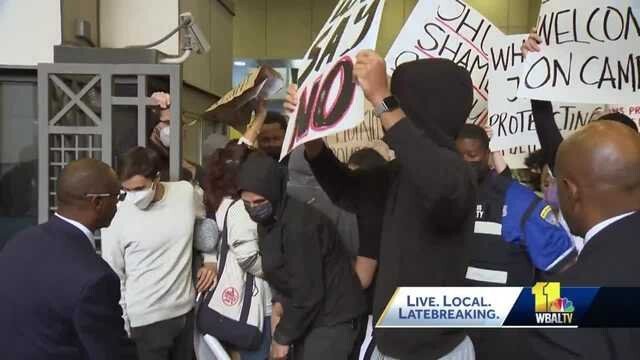Protesters make their voices heard again during second Hopkins police force town hall

Protesters once again made their voices heard during a town hall meeting on the Johns Hopkins University private police force.
By Breana Ross
Click here for updates on this story
BALTIMORE (WBAL) — Protesters once again made their voices heard during a town hall meeting on the Johns Hopkins University private police force.
This comes after protesters took over the first town hall meeting last week, forcing leaders to move the meeting to a virtual format.
While Thursday’s meeting was held virtually, but that didn’t stop students from standing up and getting loud.
It is the second of three town hall meetings on the issue before it moves on to Baltimore City Council, but some protesters don’t want that to happen.
Protesters marched through security outside of the town hall meeting at the university. They are against a push by Johns Hopkins to create its own private police force for its campuses.
“A majority of the student body, the faculty, grad students, everybody involved in the community has said this is not something we want, this is going to be potentially dangerous for the community. In fact, it will be dangerous for the community,” said Xandi Waystone, a student protester.
“Private police forces have terrible track records for abuses and violence,” said one man who was identified.
Before the first town hall meeting last week, the university released its memorandum of understanding detailing how Hopkins would create a police force to patrol the university’s campuses in Homewood, Peabody and east Baltimore (click links for maps). Their jurisdiction would include garages, sidewalks and streets within those boundaries.
While the meeting was virtual, the auditorium at Hopkins was open to allow people to watch the meeting.
And the protesters again took over, chanting loudly, drowning out the livestream of that virtual meeting meant to be a public forum to give information about the Hopkins memorandum of understanding with Baltimore police.
“We don’t know how many people don’t come here for treatment or to work or study because of violence and it’s our responsibility to do all within our power to prevent that from happening,” said Branville Bard, vice president of public safety.
But not everyone in the city is against the police force. Some community members said it would make them feel safer.
“As many entities, as many police that we have patrolling, as many citizens we have looking out and making it a safe community, I welcome all of it in Baltimore City,” said Tehma Smith Wilson, a Baltimore resident.
“Our city is out of control. When it comes to crime, anything that will help our police department with what they’re doing help ease up in their efforts to fight crime in the city would be a major support,” said Samuel Redd, director of People United to Live in Safe Environments.
After about a half hour of protesting inside the auditorium, Hopkins officials turned off the meeting and asked them to leave and they did, but they said this isn’t the end.
“It’s really just a façade. It’s a façade of democracy, it’s a façade of a town hall,” Waystone said.
After Thursday’s meeting, Hopkins said in a statement: “This evening, Johns Hopkins University held the second of three town halls to discuss an initial draft of the proposed Memorandum of Understanding between the Baltimore Police Department and the Johns Hopkins University Police Department. Information on the MOU was presented both virtually and in-person at Turner Auditorium, and audience members had the opportunity to ask questions and convey feedback in real time via text, email, and JHU’s public safety website, and to submit handwritten comments and questions at Turner Auditorium. Tonight’s was an important opportunity for conversation and community input on the MOU between the University and the Baltimore Police Department, and we are grateful to all who chose to participate this evening; the feedback captured from tonight’s conversation will directly inform the final operational agreement between the BPD and Johns Hopkins. We continue to encourage members of our community and neighbors throughout Baltimore to participate in the extensive MOU engagement process which includes the public comment period, city council review, and additional listening sessions.”
The next virtual town hall is Friday at 1 p.m.
Before Thursday’s meeting Members of the Baltimore City Council’s Public Safety and Government Operations Committee on Wednesday received an update on the university’s plan for the private police force and how Baltimore police plan to address concerns about trust highlighted at last week’s town hall meeting.
“Both Hopkins and BPD are listening to what people are saying, trying to identify what kind of changes need to be made to make sure everyone is comfortable,” said Michelle Wirzberger, director of government affairs for Baltimore police.
The state changed the law enforcement disciplinary process, and a Hopkins police force would fall under that law with requirements to submit to that process.
Please note: This content carries a strict local market embargo. If you share the same market as the contributor of this article, you may not use it on any platform.